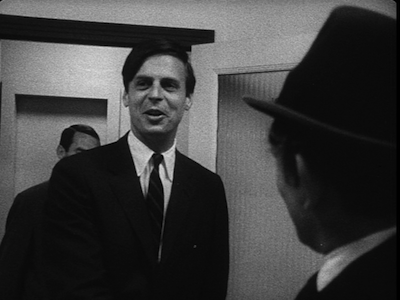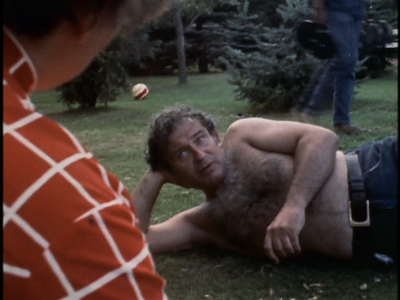Love on the Run could have just as easily been called "Coming Home to Roost," but the film's title is not merely meant to be descriptive of this, the final entry in Francois Truffaut's Antoine Doinel series, but of the entire cycle of films. Antoine (Jean-Pierre Léaud) is always running. Away from one relationship--be it his mother, his girlfriend, or his wife--and toward another.
The meaning becomes clear early on when Antoine is spied sprinting from the courthouse by his one-time object of affection, Colette (co-writer Marie-France Pisier). He has just finalized his divorce to Christine (Claude Jade), and Antoine is running to get to work. The destination is immaterial, however; as Colette says, same old Antoine, always on the run.
Truffaut apparently declared Love on the Run a mistake, and he even said he knew it was a bad idea even while they were shooting it. He couldn't have been more wrong, not at any time. Love on the Run is a supremely satisfying conclusion to the cinematic life of the director's most famous avatar. It is a culmination of all the romantic yearnings he has been feeling since The 400 Blows [review], and an affirmation of the classic cinema that informed a young Antoine and inspired his author.
In this film, released in 1979, nearly a decade after Bed and Board [review] (though the film intimates it's only been three years), Antoine has finally left Christine and is carrying on an affair with a young girl who works in a record shop. Sabine (Dorothée) is a happy-go-lucky kind of girl, not afraid to tell Antoine what she wants. Which is good, since he is a figure in transition and needs some direction. He has published the novel we saw him laboring over in Bed and Board, but he still works at a printing press to make ends meet. The divorce has been a long time coming, and the pair still share a child. The paperwork and judge's approval doesn't really make it feel like time is closing.
This sense of emotional upheaval is only exacerbated by the return of Colette, the girl who preceded Christine (see my review of Antoine and Colette and Stolen Kisses for that history). She is a lawyer now and single, as well. She is dating the owner of a bookstore (Daniel Mesguich). She also has her own troubles. She and Antoine share old times while on a clandestine train ride. Truffaut cuts in lengthy scenes of the other Doinel films, as well as incorporating some material from Day for Night . Love on the Run is a cinematic clip show, a review of all that has come before. We see the pieces of Antoine's past laid out like a romantic puzzle, complete with memories added by both Colette and Christine. It has an analogue in the here-and-now puzzle Antoine has been trying to put together: he found Sabine because of a torn-up photograph. The identity of the mystery girl that he reassembled demanded to be answered. Is it fate that has brought all these people together? Has all that has happened truly been to push Antoine toward Sabine?
. Love on the Run is a cinematic clip show, a review of all that has come before. We see the pieces of Antoine's past laid out like a romantic puzzle, complete with memories added by both Colette and Christine. It has an analogue in the here-and-now puzzle Antoine has been trying to put together: he found Sabine because of a torn-up photograph. The identity of the mystery girl that he reassembled demanded to be answered. Is it fate that has brought all these people together? Has all that has happened truly been to push Antoine toward Sabine?
Well, the answer is probably obvious, but I will leave that to you. I will say that at the heart of every cynic lies a romantic, and Truffaut has perfectly captured the doubts and fears of those of us who want to believe in true love and found a way to give us the emotional thrill we were hoping for but would never accept outright. My affection for Antoine swelled in this one. He is even more single-minded and pedantic than ever, but Léaud makes his lecturing charming. "My finger is raised, so let me tell you a thing or two about love."
I wish the end to my own story, the one that led to this project and was described way back in my write-up of The 400 Blows, had as interesting a conclusion. Or even one as meaningful. I've strived for similar synergy in my fiction. My novel The Everlasting could just as easily borrow the title from Antoine Doinel's, Les salades des l'amour, or Love and Other Troubles. The cover depicts my own version of Antoine's central problem: there's a girl in front of him, so why is he looking somewhere else.
But no, like Antoine, my life is not as interesting as my fiction, so when I write novels, embellishment is required. There is no such embellishment here, except for unintentional tricks of memory or the vagaries of perception.
Back in the summer of 2007, the girl from the video store whom I had nicknamed Truffaut was back in Portland on a break from school. I had stopped working at the store, but I had run into her at her summer job at a restaurant and we caught up on things. Since I was reviewing films, I suggested she should maybe come to a screening with me. The next one was Steve Buscemi's remake of Theo van Gogh's Interview. It was in the middle of the day. We met at the theater, and we both dressed nice. So far so good.
The film was decent [you can read my review], and afterward we decamped to the bar next door to have some drinks and talk about it. We spent a good amount of time chatting. It was fun. I was smitten. In the interest of full disclosure, I probably had a beverage too many, but I was nervous and I wasn't used to drinking during the day. This was a major factor in me not trying to kiss her when I walked her home. I knew there was maybe another fellow in the picture, and I had decided I didn't care if there was, but that probably compounded what I believe to be my mistake. If I had made a move then and there, maybe I'd have done the damage needed to replace him. The problem was, being a little tipsy, I wasn't feeling physically confident, and I felt a bad or fumbling kiss would be worse than none at all, so I didn't take my shot. I did, however, suggest we meet the following Friday when she got off work. Truffaut agreed. I was to get in touch that day and firm up plans.
Friday came, and when I called, I got voicemail. I can't recall if I did a follow-up call or a text, but no answer ever came. I knew Truffaut was leaving on an end-of-summer getaway in a manner of days. There wasn't much of a window.
While she was away in whatever tropical paradise she had scheduled an escape to, Michelangelo Antonioni died. He was someone we had discussed. I texted her and said, "Michelangelo Antonioni died, and you're on a beach somewhere. How is that fair?" Or something to that effect. I may have added myself into it. "You're there, and I'm not."
That was it. It was the last communication between either of us. Not unlike some of Antoine's angry letters to Colette and Christine, I might add.
Though, the story has a last anecdote, its Stolen Kisses moment, a brief encounter after time had passed. I went out to the movies with another girl, a friend of mine who is quite lovely. It was a winter afternoon, and as we were leaving the theater, Truffaut and some other guy were heading in. We said "hi," and when she was past, my friend asked who she was. I told her. My friend had been aware of the summer fumblings, and so for her she finally got to put a face on the stories. Even though my outing that chilly day was not a romantic one, Truffaut did not know that, and I hope there was some small pang of jealousy, a brief rivalry, a nagging doubt that she had made a mistake and was with the wrong guy.
"Because let's face it...wasn't she?" he typed, but then realized there was no dignified way to add a wink to this without resorting to an emoticon, so he decided for something far more self-reflexive instead. Wherever he is, Antoine Doinel probably approves.
















































